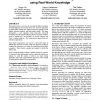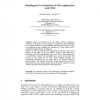1380 search results - page 122 / 276 » Decomposable Modeling in Natural Language Processing |
EMNLP
2011
13 years 9 months ago
2011
We present a general learning-based approach for phrase-level sentiment analysis that adopts an ordinal sentiment scale and is explicitly compositional in nature. Thus, we can mod...
102
click to vote
MODELS
2010
Springer
14 years 8 months ago
2010
Springer
Formal analysis can be used to verify that a model of the system adheres to its requirements. As such, traditional formal analysis focuses on whether known (desired) system propert...
IUI
2003
ACM
15 years 3 months ago
2003
ACM
This paper presents a novel way for assessing the affective qualities of natural language and a scenario for its use. Previous approaches to textual affect sensing have employed k...
UML
2001
Springer
15 years 2 months ago
2001
Springer
Today's User Interfaces (UIs) are complex software components, which play an essential role in the usability of an application. The development of UIs requires therefore, not ...
ICASSP
2011
IEEE
14 years 1 months ago
2011
IEEE
Discrete-time Volterra modeling is a central topic in many application areas and a large class of nonlinear systems can be modeled using high-order Volterra series. The problem wi...


